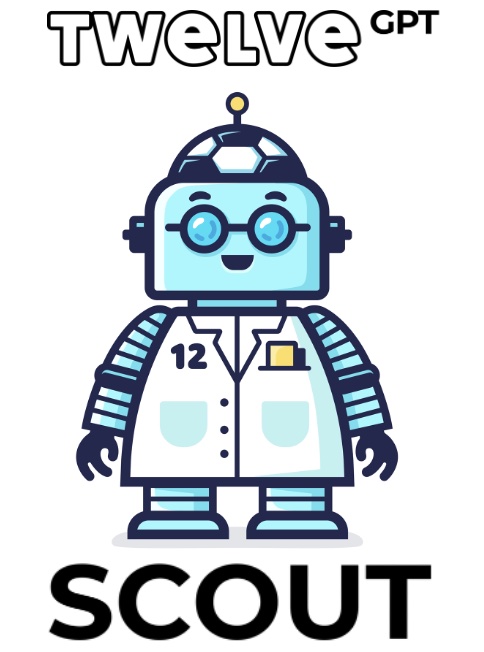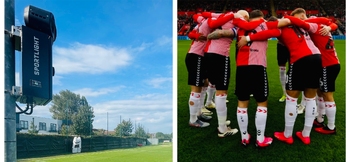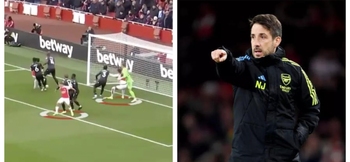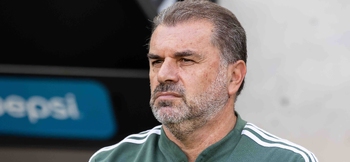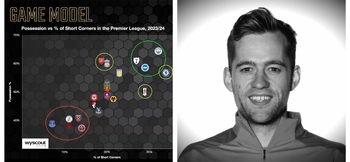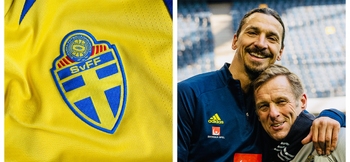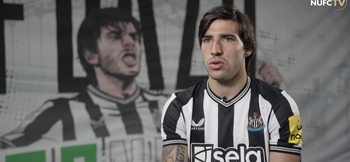Natasha Patel: Innovating in New York and Southampton
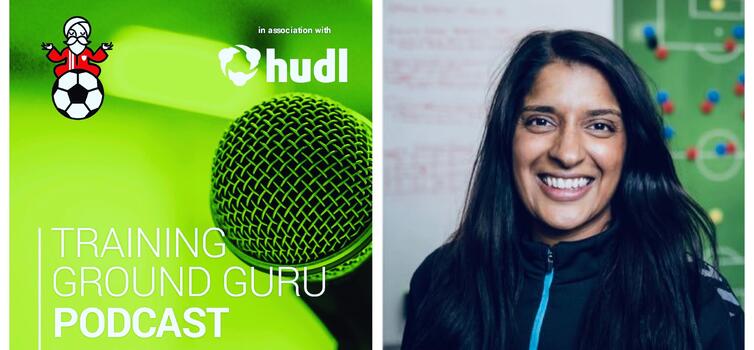
Natasha Patel: Assistant Academy Director at Southampton since December 2022
Written by Training Ground Guru — April 5, 2024
Natasha Patel is Assistant Academy Director at Southampton and one of the most experienced women working in men's professional football.
Patel joined Saints' embryonic analysis department in 2011, going on to lead it as Head of Performance Analysis. In 2019 she left to take up the same role with New York Red Bulls in the MLS.
At the end of 2022, Patel got the chance to return to her beloved Saints as Assistant Academy Director. In Episode #64 of the TGG Podcast, in association with Hudl, she outlined her journey in football, how analysis has evolved and her experiences on either side of the Atlantic.
You can listen via the Player below and read an edited transcript after that.
GROWING UP
Natasha Patel: I was born in Essex and have always loved football. I have two older brothers and we always played football together in the back garden. They're massive Liverpool supporters, but I was a Tottenham supporter growing up.
Whenever football was on the TV, we always watched it, so, it was always very much a part of our household. My middle brother started playing for his local team and that got me interested. When I was seven, we moved to a little town called Chippenham, and my local primary school around the corner had a team.
My teacher saw I was always playing football during the lunch breaks or after school and said, 'Come along and play in the team.' At the time, it was very much a boys' team, but at that age there were no physical barriers or anything, so I was quite comfortable playing. I just loved playing football.
My mum, when I was coming home from school, had to drag me indoors because I always just wanted to play football in the street with my friends. I didn't play to a high level, just for Chippenham Town until I was about 18.
In terms of having a career in the game, I didn't really know that was possible. I knew I wanted to be involved in football, I just didn't know where an opportunity would be available.
My teachers suggested I go and study Sport Science, to get a bit of a broader range of the different disciplines within sport, and see what that could do for me. I was very fortunate to get an opportunity to go to Liverpool John Moores University, and I studied Sports Science, Psychology, Biomechanics, everything you could imagine.
I had a really good lecturer called Allistair McRobert. He must have known that my scientific side wasn't as strong as my interest in football and analytics, so he suggested I look at the analysis module they were doing. This was around 2009/10, my last year of study, so I already had two years of Sport Science under my belt, and wasn't sure where I wanted to go.
We had a classroom of MacBooks and he said, 'Why don't you come in, have a look at what Sportscode is and start watching some games?' He knew I had a passion and I would spend hours in there dissecting games. He spent a lot of time with me just reviewing games. That was brilliant for me to just get a little insight into what analysis was and, potentially, a possible career.
That was back in the Prozone days. Nottingham Trent University had one of the first Masters in Performance Analysis, so Allistair recommended I go over there. I had another brilliant lecturer there, called Matt Robbins, and was able to really get into the history of analysis and notational analysis. There were also a lot of applied modules where I could actually go into a bit deeper.
We did a lot of work with Prozone, using their links with Nottingham Forest. We would go into the club at weekends and film games and then spend the Monday, I'd say about eight hours, coding everything: who touched the ball, who did they pass to, where did it go, what did the action lead to.
I think it was the first time I thought, 'Hang on a minute, the output you can gain from this and the insights you can give to the coaches and players is amazing.' The outputs were brilliant, but you're spending eight hours!
Matt was another great lecturer who was really patient with me and incredibly supportive, as I wanted to learn more and was asking a lot more questions. I really just wanted to have a career in analysis and in football.
JOINING SOUTHAMPTON (AUGUST 2011 to SEPTEMBER 2019)
Matt Robbins had a link with Southampton, and they were looking for interns. He got me in touch with Andy Stone, who was Head of Analysis (and now works for Stats Perform), and I went down for an interview and they took me on on an internship as an Academy Analyst.
It was kind of a blank canvas, but with his guidance. Steve Kay, an experienced analyst as well, was also in the building, so I had people to speak to, to get support from and I also had some brilliant coaches that I got to work with.
Some of them were at the beginning of their careers and some of them quite established, but really saw the benefit of using video and data to either impact their decision-making or help youth development. So I joined at a brilliant time, where anything that I contributed in terms of analysis was an added bonus.
And I had a great Under-21s coach, Martin Hunter, who went on to become Technical Director. I think he really took me under his wing. I just obviously wanted to learn more about the way the Southampton Academy played and how video could impact him and the players. He just got me involved as much as I wanted to be.
I gave everything to try to help him, to help the players; and in return I learned and grew in a short space of time. A lot of it was match analysis; a lot of it was heavily team-based - the way we were playing, our style, how that imposed or impacted on how other teams played. At that time, there was quite a clear identity within the Academy and that was from Les Reed when he came in (as Head of Football Development).
It was a great education in terms of how they wanted to play and also developing my technical and tactical understanding, which was quite basic at the time. There were a lot of open people who thought video could really help us understand how we wanted to play, how we wanted to analyse the game, how we could develop players.
I was with the 18s and the 21s, so I'd be filming training, filming the games. One Saturday I'd be with the 18s, getting the bus up to Sunderland. The next week, I might be going to Manchester United on the Monday with the 21s.
So I was pretty much on the road every weekend but I was hungry, I was loving taking in everything I could, from the coaches, strength and conditioning coaches, the players. It was brilliant. It was creating opposition meetings, half-time analysis, post-match analysis, getting involved in any individual meetings that we wanted to do.
When I first came to the club, there were only two full-time analysts. At the point I was leaving, there must have been seven or eight, including work placement students. The club managed that programme really well.
I became the Lead Academy Analyst and we employed four full-time analysts within the Academy. It gave opportunity for me not to go across so many age groups, but to actually get some quality for our players and support our staff as well. It grew so much and I think credit goes to the club and ownership at the time but also to the staff we employed. A lot of the full-time analysts at the time had come through the work-place programme.
When Alex (Kleyn) came in, he grew that (data) side and we worked quite closely together in terms of broader data - analysing our team and individual performance - to really honing in on evaluating what success looks like. That was not only from a technical and tactical perspective, but also the physical side and other metrics.
We were able to get a complete profile of players coming through our system and started to benchmark what it looked like for any individual coming through to be able to perform at the highest level. Then we started to do a lot more work around the world, comparing different players to the ones we had in the building.
The analysis, recruitment, and coaching frameworks were heavily aligned in terms of position profiles, the way we wanted our teams to look and our language. Les Reed and Martin Hunter were really clear on having a playing philosophy aligned across the football club, so that helped with all our departments.
At the time, analysis and recruitment were merged into one. A lot of my work was measuring how we impacted development in the club and how that had a knock-on effect on performance, both long and short-term.
I also worked quite heavily with the transition players when the U21s were then changing into the U23s. A lot of those players then were going to the first team, so I did a lot of the Individual Development Plans (IDPs) with Radhi (Jaidi) when he became the U21s coach. We did a lot of work looking at not just the players' football side, but also any other aspects of their life, be it nutrition, strength work, anything that they might need support in.
We started to look at having deeper analysis of how we could help this person progress, either at Southampton or beyond. Part of that was tracking the loanees - so who was going out to watch them, working with the recruitment department, seeing if they had scouts going out to see our players, and Radhi and I would then send individual clips to that player so we kept in contact with and feeding back to those players. That was my exposure to the first team really.
Because I wasn't naturally attached to a team when I moved into the Head of Performance Analysis role, I could be across all the performance processes and frameworks we had in place to support the analysts as best as I could. Then, in a knock-on effect, I'm supporting the coaches and players through the analysts.
SECRETS OF SUCCESS?
I think it's just being willing to learn and grow and give as much and insight and make as much impact as you can in whatever field you're in. I think I worked incredibly hard, I worked relentlessly. I was always true to myself and tried to give a different viewpoint. What I do is very much evidence-based decision-making and that's what I've always stuck to.
It's about knowing your surroundings, trying to build relationships and working on them. We want to have collective success and sometimes that can mean having tough conversations, but once you build trust and solid relationships, you can challenge and support each other.
I've always felt supported and also challenged wherever I've worked, but in a respectful way. A lot of that comes down to the care I have for people and the care people have for me. I was given autonomy to build a framework in the analysis department and also regarding the people we employed, who came through as work placement students.
And all credit to them - Tom Gardner is now at FIFA, Nathan Hurst is now the Interim Head of Analysis (At Southampton), and Andrew Moschini has gone into the first-team recruitment world (at Arsenal). First and foremost they were brilliant people, who were really caring and kind and committed to doing the best they could and who had a growth mindset.
They helped drive the department forward, because they were in and amongst the coaches and analysts when we were really progressing. One thing I think we all had was a really good trust and respect for each other and a really special bond that made us want to be successful together and really work for each other.
I really am fond of some of those memories. Sometimes the life of an analyst isn't so glamorous, but because we had such a good group we made sure we made it fun. When you're hitting some of those low points we made sure we picked each other up.
The game's evolving and roles within football are evolving massively. Would I have thought I'd be in the role I am now, if you had asked me three, four years ago? I probably wouldn't have seen it as a pathway, no, but football is evolving and expertise is crossing over naturally.
I am still very observant of how people take on information, the way they like to receive it. In any role you've got to be self-aware of yourself and other people and work out when's the right moment to give intervene or give information. That depends on which age group you're with or which environment you're in.
Then there's the means of delivery, because that's different for everyone and every situation. It might just be on paper or a WhatsApp a conversation - again, it comes down to your relationships with that individual, with that coach.
Over the years, the first thing I've tried to do is understand the coach I'm working with, as well as the players, and also the strategy we're going after.
NEW YORK RED BULLS (SEPTEMBER 2019 TO DECEMBER 2022)
Paul Mitchell was Technical Director of Red Bull and we had worked together before at Southampton. There was an opening over there and he spoke to me about it and said, 'Is it something you're interested in?' He knew I'd come to a point where I needed to push myself out of my comfort zone and needed a new challenge.
I had an interview with the Sporting Director, the Head Coach, met quite a few staff, and went through a rigorous process. I thought, 'You know what, when in my life am I going to get an opportunity to move to New York and build a brand new department?' I didn't want to look back and say, 'I wish I could have gone there.'
I thought there's a possibility I can grow and develop even more and enjoy my career, enjoy my life. It wasn't even just about the football. It's amazing that football can take you to different places in the world.When I went to New York Red Bulls, I was fully into the first-team world. It was probably my first taste of that environment, where there are higher stakes than ever.
When I went out there, I didn't know anyone. I'd come from a football club I'd been at for nine years, where I'd spent my twenties and loved every minute, and moved across the world. It really tested me and everything I thought about myself; the good, the bad and the ugly. And that's part of why I went. I'd been part of a great department, a great football club, and wanted to go to somewhere new and really test myself.
I had another blank canvas but across a first team and Academy, so I was responsible across the board. That was a great chance for me to learn a different culture, speak to different people and work with coaches that had no idea about who I was, what I was about and who had different views on why or how we should do analysis. So of course that came with different barriers.
The first year was probably one of the toughest I've had in my career. Moving away from Southampton, from people I love and care about, into a whole new world - and then Covid came into the mix on top of it. There were a few days when I thought, 'God, what have I set myself up for?! I had a really great life back home, what am I doing here?'
But I knew the more time I spent there, I'd be stronger because of it. There were some great people that I met, some of my best friends now, and during COVID you end up making strong relationships from the weirdest situation.
We had a COVID bubble at the club, everyone was testing pretty much every other day, and everyone had to muck in together. I wasn't the only one that had moved away from home, so within that you get to see a vulnerable side to other people. We were all in it together and it was real interesting experience.
In our staffing group and also the players there were individuals from all over the world, speaking different languages, more than I'd ever been exposed to before. I learned so much in terms of leadership and processes from Kev (Thelwell), when he was there (as Head of Sport). He was really clear on what he expected of us and had clarity about what he wanted the vision to be and the strategy. I loved being a part of that, being able to execute that in the analysis space.
There are definitely golden threads that go through the Red Bull model. It's definitely to make sure the opponent doesn't have any time and space on the ball and to eliminate strengths from the opposition. If different Head Coaches come in, they'll have their slight different ideas on the way they want to build and play through the thirds, how aggressive they want to be on the press.
Ralph Rangnick was the Director of Football across the group and Paul Mitchell was the Red Bull Technical Director. Gerhard Struber, who'd come over from Barnsley, was Head Coach and probably wasn't used to having the type of analyst I was. I wouldn't say I'm heavily tactically and technically astute, but I was really good at working with the IDPs with him and trying to balance winning versus long-term development, because we had a really young group.
We worked really closely together to have IDPs for all our first-team players. I did a lot of check-ins with players and he gave me a lot of opportunities to deliver meetings. So if we did a six-week game review, he would get me to do that and was really keen on having different voices.
I had some of that at Southampton, working in the Academy, but getting that opportunity with the first-team players in New York was brilliant. We had a coach-analyst, an opposition analyst, so really different skillsets. There were so many different characters, even in the dressing room.
One day you're working with a senior International player and the next with Academy players coming through the ranks. They were really open to anything that our department gave them.
We had a goal to be a top-four club and and every year we always made the play-offs. One year we were close to not making it and started to dip and had to really get our heads together - the staff, the management at the time - and think, 'What is it that's going to push us through? What do we need?' A lot of that wasn't even on the football side, it was the connections on the pitch and whether everyone understood their roles and responsibilities.
We started doing shorter video meetings. The schedule in the MLS is crazy, because you spend so much time on the road, so we had to work out how to maximise that time and give recovery time. We went really deep into working with all the performance disciplines to give us an opportunity to recharge when we were away, while also giving a clear focus of what we needed to achieve, why and how when we were going into a game.
We also looked over the next six to eight-week period, so what those games looked like and what the players needed from that period. For example if you're going into a New York City Derby, you know it's going to be lots of emotions, there's going to be a big crowd and you know they're going to be very heavily possession-based. So what's our strategy?
We had had an intense pre-season period, so everyone knew how we wanted to play. At this point it was more about what are our little pressing triggers going to be, who are the individuals we need to target, what are our strengths. We started to do a lot of workshops with the players to get them to take ownership of this.
Sometimes we didn't pick up points, but had to pick everyone up, carry on going and remain focused. We had a real togetherness during that period. There wasn't any finger pointing and we developed a culture where we could be more honest and vulnerable.
Collectively, we we did a brilliant job of bringing everyone together. When we made the play-offs, I remember we went to Nashville and the emotions were high and we got the result we needed. The feeling when we went into the dressing room at the end was electric and one of many moments from my time at the club that I won't forget.
That sense of joy and pride in everything we did was was unbelievable. If I look back on that year, a lot of what I learned I've tried to take into my next steps. So my thought processes during that time, how we made the players feel, how we made the staff feel, how we ensured everyone was clear on what we wanted to do. It sounds quite simple, but we really did just strip it back. When you play so many games, you have to think about how much information people can take on.
EVOLUTION OF ANALYSIS
When I was doing a lot more of the day-to-day analysis (at Southampton Academy), after training they (the players) would want to come and look at their clips. I even remember years ago, with the 21s group, we would put the games up (on Hudl) so they could watch them. They would come in the next day and tell me what clips they wanted in the opposition meeting.
I think there's a lot more ownership and players want to review their own performance, because they know it's going to develop them. They have so many opportunities and so much exposure to different staff, not just the technical and tactical.
If you're in the first team, there are only 11 spots, so if there's an opportunity to get better, players are going to be open to that. Unless they review back what they're doing, they won't understand why they've been successful or not for the next time.
If it's to help their decision-making, I only can see it (video analysis) being a positive tool, whatever department they're working with. Having video live during games or in training is just an opportunity to learn and reflect. Does it mean you're going to spend the whole time looking at video? No, I don't think you need to, but if it's one clip that's going to support or challenge a decision that you've made and that's going to help you get better then you'll go for it.
We've have had Sportscode at the club for many years, probably since I started at Southampton. Back then, if you wanted to export a video you'd have to wait probably an hour for a five-minute clip to export and couldn't do anything else on the computer at the time. That's changed a lot since!
We use Sportscode right across the football club. A lot of the PDP coaches have it and if there's anything they want clipped out individually, they can get that from the analyst. If you're going to use live analysis, the way you do this will differ between age groups, depending on the session and what outcomes you want to get and where you're going to do that on the football pitch.
We've got fixed cameras that have been there (on the training pitches) for some time now, but you've got the ability to capture pitch-side as well, which gives you flexibility if the coach or player wants to review back. We can do that directly from the cameras at the moment, but if it was away with the younger Academy teams, you would have to use portable cameras.
With the first team or older Academy teams, we have the hi-pod. We don't use drones, because we've got these high cameras and don't need to. They're always at fixed points and, depending on what pitch you're on, either a wide angle and behind each goal. It gives you the flexibility to think what's the best angle to have a look at that session and where you're going to get the best use of it.
RETURN TO SOUTHAMPTON (DECEMBER 2022)
Just over a year ago, there was an opening back at the club as Assistant Academy Director to Matt Hale. Matt always knew I was passionate about the Academy and youth development. When I left, I kind of knew I wanted to go into the Academy leadership space, but wasn't ready. Again, I just wanted to have more experiences under my belt so when the opportunity and role came up, I had to put my name into the hat.
I'm thankful that both Matts (Crocker and Hale) took me under their wing and gave me the chance to come back. I felt when I left that I always would come back at some point. Even the first year when I was in New York, I felt like I was on a study visit. I always have love for the football club, so getting a chance to come back into a different space was something I'm really thankful and proud to do.
I was doing a lot of work in my last year with Matt in helping on player development, on how we're assessing players, and helping his decision-making process. That gave me a bit more exposure to the Academy Director world. Even in my last year over in New York, a lot of that was player management, looking at the IDPs, working more with the performance staff, so I was starting to make the transition at that point anyway.
There were still a lot of people I knew at the club and I knew how it operated, so it was a bit more of a smooth transition. If I went to a different club, it might have been different. Because I had so much passion and love for the club it helped when I came back.
We have a new Academy vision now and with that comes new structure. Obviously we've had changes in the staff and within that we've had some internal promotions. In fact I think there have been more internal promotions than ever before in the Academy, which has been brilliant. We're building towards a new vision and it's going to take a bit of time.
There's obviously a process and I think we're making a bit of progress already. We want to be consistent with our approach. That's something I've tried to do throughout my career - looking at whether we have a clear and consistent approach to what we do and why we do it, in terms of how we develop and coach players.
I've got a really good relationship with Russell (Martin), Andy (Goldie), Jason Willcox, and we work quite closely together. I think it's really important to have that one-club approach and to have clear messages and a clear way of doing things across the board. We've got a really good chance of developing and providing the best opportunities for our players to go and have careers.
That's the ultimate goal of the football club, to provide homegrown talent for the first team. When players make their debuts, that's one of the proudest moments for me working in the Academy. It's an unbelievable feeling to be a part of that journey with them.
FUTURE AMBITIONS
Of course I'm ambitious. I think first and foremost, I will continue to do the best I can in the job I'm in every day. Football's evolving, so roles are evolving. I probably wouldn't have seen this role as being possible for me three or four years ago, and here I am.
I want to help the Academy, help the football club as much as I can and eventually take up more leadership roles. I think that's a by-product of being true to myself and giving everything to make sure we're going in the direction we need to go in.
I'm pretty open. I think any club, any organisation that I want to go into longer-term has to be aligned with my values and future ambitions. You give so much time and energy, I think you really want to be fully involved - and I'm all-in in everything I do.
Hopefully that takes me to meeting more people and new experiences. You only get one life and I want to make sure I enjoy it and maximise it - with myself, but also my friends and my family as well.
At Southampton and Red Bull, they've been open, supportive and have challenged my ideas. Obviously, a big part of my background is analytics, providing insights, being evidence-based. I've always worked to make sure I contribute. I don't take energy away - I try to leave a room more energised.
I've not faced challenges where I've gone, 'Ok, this is something different than than I thought.' I think cognitive diversity is probably the most powerful thing. It's really important to get people that think differently but also have some form of alignment. Different ideas and experiences within a workforce can help you to grow and develop as a group.
Any conversation I've had, especially in the past year - which hasn't always been the easiest, because we've gone through a transition as a club - I think people know it comes from a place of me caring. I've got that from every mentor and leader I've had: when they have needed to have a difficult conversation with me or with someone else, it is because they care.
That's a really good place to start. I'm still quite early in this chapter in my life, but I'm reflective on how I speak to people, the way I do it. I used to do that with the coaches when I was an analyst - thinking about how they take on information and when is the appropriate time to maybe be a bit more forceful. It comes down to understanding the way that people operate.
Once you have a group of people that understand each other first, that can connect together, you're in a good place.








